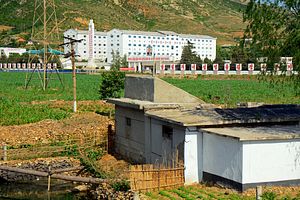Kim Jong-un’s recent nuclear saber-rattling has triggered a swift and strong response from the UN Security Council, with some of the harshest sanctions imposed in decades.
Pyongyang portrays the latest measures as a U.S.-led attempt to cut off North Korea from the rest of the world and hurt its citizens.
But before the regime blames others for North Korea’s status as a “hermit” nation, it must first address the isolation it imposes on its own people.
The rule of North Korean leaders has always relied on absolute control over the flow of information in and out of the country. Now, the mobile phone and digital frontier has become the latest battleground in this attempt to maintain its stranglehold on communications.
International calls are blocked for North Koreans using the country’s popular domestic mobile phone service, which has more than 3 million subscribers. Access to the Web is restricted to foreigners and only a select few citizens.
Since coming to power in 2011, Kim Jong-un has intensified the repression and intimidation against ordinary North Koreans trying to contact the outside world. People risk being sent to political prison camps or other detention facilities if they are found contacting loved ones who have fled abroad.
This harsh reality is revealed in a new report by Amnesty International, Connection Denied, which documents the array of restrictions on mobile phone use and access to outside information that ordinary North Korean face.
The informal private economy, with trade across the Chinese border, offers a chink of light through this 21st century iron curtain. The growth in the illicit trade of imported mobile phones and SIM cards, enables North Koreans living near the border to access Chinese mobile networks and communicate directly with people outside the country.
These smuggled phones provide a lifeline for people wanting to communicate with family abroad, for those wanting to escape the country, and for traders trying to earn a living.
A generation of entrepreneurial North Koreans and Chinese living near the border have set up an informal but efficient network of brokers, through which people can communicate with family members abroad, receive remittances or coordinate business transactions – for a hefty commission.
While speaking with people outside the country is not in itself illegal, this kind of brokerage is against the law in North Korea, as is the private trading of communications devices from other countries.
People who make calls on these smuggled phones can also face criminal charges, including treason if they contact someone in South Korea or other countries labeled as enemies.
The authorities have hit back against the use of these phones, importing modern technology to monitor and block communications, supported by traditional person-to-person surveillance. Border security has been tightened to stop private trade, and to prosecute people who try to leave the country.
Kim Jong-un has justified such repression as necessary to stop what he calls “the virus of capitalism.” But nothing can ever justify people being thrown in detention for trying to fulfill a basic human need – to connect with others.
This pervasive violation of the right to freely express oneself and seek and receive information and ideas, stops North Koreans from telling the world about their almost complete denial of human rights.
They are also deprived of the chance to learn about the world outside, and people abroad are denied the chance to develop a deeper understanding of North Korea.
At a time of tough sanctions, North Korea is likely to see its isolation from the world as being imposed by what it calls its enemies. If that is the thinking of Pyongyang, it is even more important that they allow people to come closer to the rest of the world, by removing barriers in communications.
The fast and free exchange of information in the digital age has the power to transform lives. It is an opportunity ordinary North Koreans must no longer be denied.
Dr. Arnold Fang is an East Asia Researcher at Amnesty International.

































